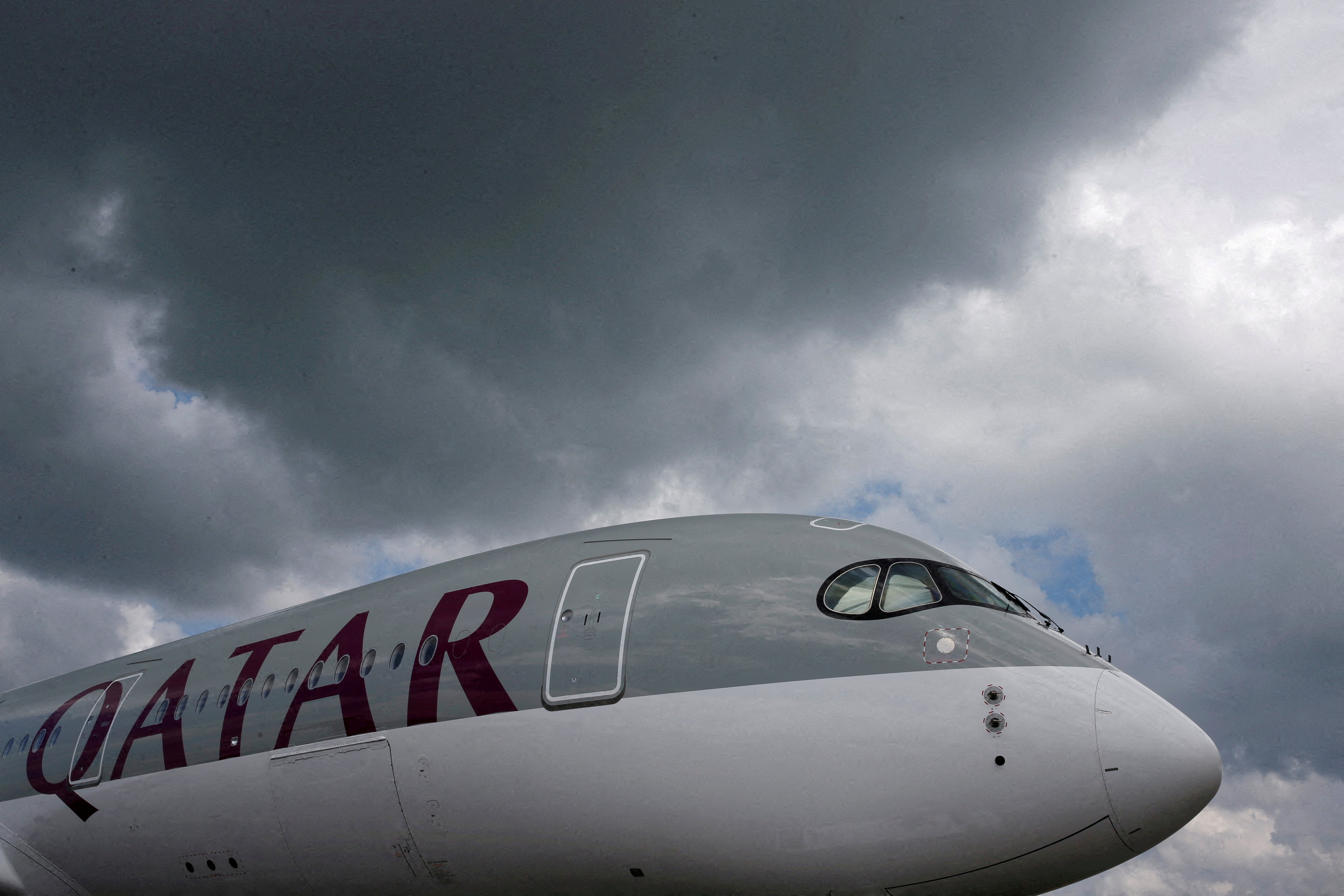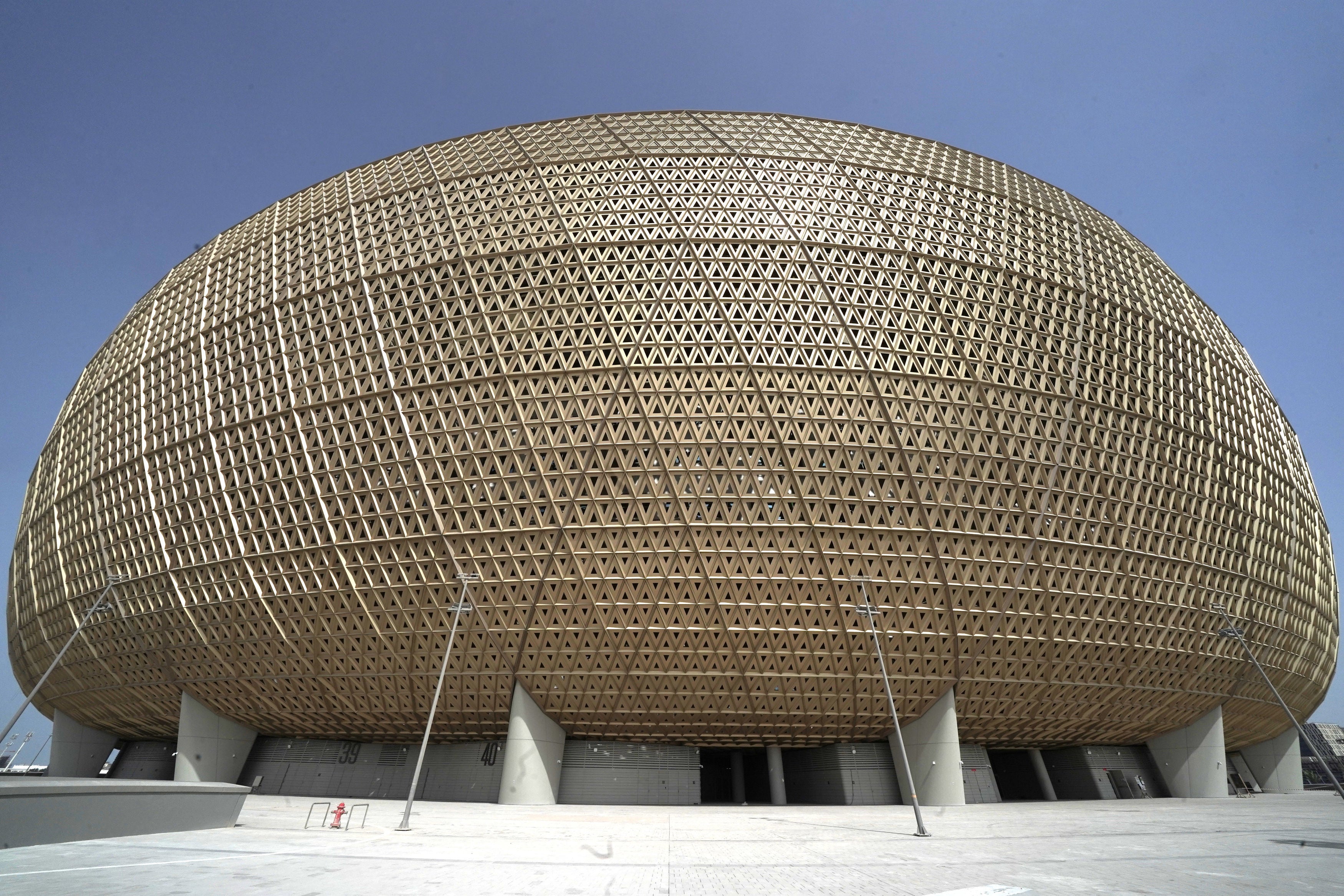‘A climate crime’: Qatar plans for extra World Cup flights attacked by environmentalists
It is meant to be the first carbon-neutral World Cup in history, but critics are increasingly sceptical of Qatar’s claims

Qatar has boasted of organising the most geographically compact World Cup as the tournament’s eight stadiums are inside or close to the capital Doha. But that claim ends at venues.
The tiny Gulf emirate is 20 times smaller than the UK, and its accommodation bank of 90,000 rooms cannot host the 1.5 million fans expected to descend upon Qatar during the tournament.
To address a shortage of affordable hotel rooms, supporters are offered to commute daily between World Cup 2022 venues and neighbouring countries – the UAE, Saudi Arabia, Oman and Kuwait.
“By choosing to book a Match Day Shuttle flight, fans will arrive in the morning and depart in the evening, with no hotel accommodation required,” Qatar Airways said in a statement, indicating 168 shuttle flights will bring up to 17,600 fans in and out of Doha every day.
That may help solve the accommodation issue but presents another problem for Qatar.
Despite building seven new stadiums and completely transforming the country in readiness for the World Cup, Qatar has long claimed it will hold the “first carbon-neutral” tournament “in history”.
But that claim, say campaigners, is fatally undermined by the latest announcement on extra flights.
Julien Jreissati, programme director at Greenpeace Middle East and North Africa, called the announcement “a crime” and said it was the “final nail in the coffin” of Qatar’s carbon-neutral pledge.

Even before launching shuttle flights, Qatar estimated that air travel would account for half of the tournament’s total greenhouse gas emissions. The aviation industry, one of the most difficult to decarbonise, is a major emitter of CO2, contributing to global warming.
An investigation released last week by Carbon Market Watch “casts serious doubts” on Qatar’s carbon neutrality claim, which “likely underestimates” the tournament’s emissions and “misleads” players, fans and the public.
The Belgium-based advocacy group estimated that the carbon footprint of World Cup stadiums “might be underestimated by a factor of eight”.
“It is unlikely that the World Cup will be carbon neutral. I think this claim is greenwashing; it just lacks credibility,” Gilles Dufrasne, the investigation’s lead author, told The Independent.
The local World Cup organising body did not respond to a request for comment.
Using the train is not an alternative form of travel supporters could opt for to avoid carbon-intensive flights. A rail network project stretching across the six Gulf Cooperation Council (GCC) countries, including Qatar, has been in discussion since the 1990s but has shown little sign of progress.
“Instead of resorting to flying in people, Qatar should have developed further options of accommodation, away from five star hotels,” Jreissati says.
According to Ralph Hollister, Travel and Tourism Analyst at consulting firm GlobalData, a good example is the multi-year Airbnb-International Olympic Committee partnership to host sports tourists within the local communities without the need to build new hotels to increase available room supply.
Yet, Hollister said he gets why Qatar might be hesitant. “With Airbnb, they are not in control of, the quality of the accommodation because you rely on hosts,” he tells The Independent. “It is no surprise that this [shuttle flights] has happened due to the size of Qatar.”

The first independent environmental association in Qatar, the Arab Youth Climate Movement Qatar (AYCMQ), has no plan in place to campaign against World Cup 2022’s shuttle flights.
Domestic criticism of state decisions is rare in Qatar.
AYCMQ’s director Neeshad Shafi told The Independent that the association plans to ask “everyone” to use its newly released carbon footprint app. “We are also planning to add an offset option in our app so that people can attend and travel guilt-free to Fifa World Cup 2022.”
Offsetting emissions, a controversial practice marred by fraud and often lacking integrity, is central to Qatar’s carbon-neutrality claim. But it opted to set up its own standard to do so, with no independent third party to certify the quality of credits purchased to offset emissions.
Carbon Market Watch found that Qatar plans to offset about half of the World Cup’s expected emissions by purchasing at least 1.8 million carbon credits via the Global Carbon Council (GCC), an entity indirectly tied to the Qatari sovereign wealth fund.
The GCC’s current available supply of carbon credits is less than eight per cent of what Qatari officials intend to purchase. Also, the GCC’s available carbon credits, from two renewable energy projects in Turkey, are deemed to be of low quality. Leading carbon market standards – the Verified Carbon Standard (VCS) and Gold Standard (GS) – reject credit from renewable energy projects as the market for grid-connected renewable energy projects is already mature enough to go ahead by itself.
“That is one of the main elements that raises doubts around the integrity and the truthfulness of Qatar’s carbon-neutrality claim,” said Carbon Market Watch’s Mr Dufrasne.
Qatar, the first Middle Eastern country to host the World Cup, is no stranger to environmental absurdities in the run-up to the tournament.

It flies in 140 tonnes of grass seed annually from the US on climate-controlled aircraft to grow 40 football pitches worth of reserve of grass, watered with desalinated seawater produced in energy-intensive desalination plants.
The decision to air-condition World Cup venues sparked outrage too. Despite Qatar claiming its cooling technology is 40 per cent more sustainable than existing techniques and that it will be powered by solar energy, the country is a climate laggard.
As of 2019, 100 per cent of its electricity was produced by burning natural gas, despite having some of the world’s best solar resources.
“What message World Cup 2022’s organisers send to the world is that they, and maybe even Fifa, are completely disconnected from the climate crisis,” Jreissati commented.
Shafi said AYCMQ “do not doubt” the country’s commitment to organise the first carbon neutral World Cup in history. Shuttle flights’ extra emissions are “already covered in the greenhouse gases calculation to be done upon completion for offsetting,” he said.
World Cup 2022’s Greenhouse Gas accounting report “included a proportion of fans travelling from the GCC region to attend matches”, a Fifa spokesperson tells The Independent, adding changes compared to the assumptions of greenhouse gas emissions, including match-day shuttle flights, will be “considered” after the completion of the tournament and “fully offset”.
According to the emissions calculator of the United Nations’ International Civil Aviation Organisation, ferrying up to 2,500 supporters daily between Doha and Dubai, the Gulf’s tourism hub, would emit 239 tonnes of CO2. That’s more than 7,000 tonnes of CO2 over a month.

Beyond figures, Mr Dufrasne suggests looking at the broader picture: “Even if offsetting numbers were to add up on paper, it risks giving the impression that we can continue without radical societal transformation, that building massive infrastructures for a single event does not have a net impact on the climate. That is very misleading because it is just not true.”
In May, following a report that is “a dismal litany of humanity’s failure to tackle climate disruption”, United Nations secretary-general António Guterres said in a tweet that humanity needs to end fossil fuel pollution “before we incinerate our only home”.






Join our commenting forum
Join thought-provoking conversations, follow other Independent readers and see their replies
Comments